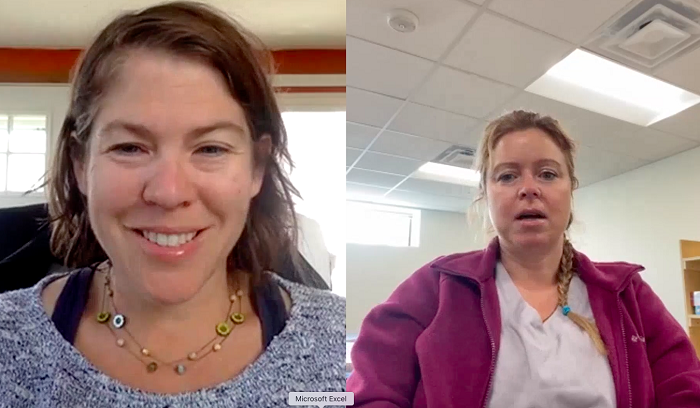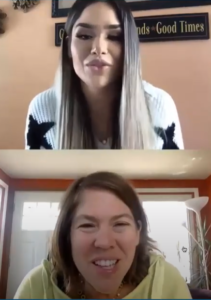- MN ABE Connect
- Archive
- In Their Own Words: ABE Students Talk About Success Strategies
 November 16, 2020
November 16, 2020
In Their Own Words: ABE Students Talk About Success Strategies
Stephanie Sommers, ACES CoordinatorThis fall I started working on a project to gather student voices and hear what they had to say about remote learning during COVID-19. As ABE teachers, we often have ideas about what makes a learner successful, but I wanted to hear from the students themselves. It was my plan from the start to compile what I learned into a session for the statewide Teaching and Learning at a Distance Conference that took place on November 5-6.
In this two-part article, I will first explain the main takeaways from this project to show just how much can be learned by talking with our students about their learning strategies. Part 2 will then follow up with a description of the process I went through to document these interviews; my hope is that you will be able to replicate what I did in your own context.
For this project, I spoke with five students, all of whom were female: three non-native English speakers, and two native English speakers who were born in the United States. There were a number of common themes that emerged from talking with these students.
Organizing time
Several of them talked about the need to figure out new ways of organizing their time so that they could balance remote learning with taking care of their children and families at home. They talked about planning meals in advance so that food was ready when someone in the house got hungry. One student, named Jessica, talked about how she gets up two hours early every day to make sure that breakfast and lunch are prepared before she starts her classes. Another student, named Yi, explained how she uses wireless headphones so that she can listen to her teacher giving a lesson while she has her hands free to help her older daughter with school and her younger daughter breastfeed.
Goal setting
 Another very strong message was the importance of having a specific goal in mind to help with motivation and persistence. One student talked about wanting to work for the airlines, while another student dreams of becoming a paralegal so that she can help other immigrants like herself. They both talked about how it’s the desire to reach their dreams that keeps them going and prevents them from ever giving up.
Another very strong message was the importance of having a specific goal in mind to help with motivation and persistence. One student talked about wanting to work for the airlines, while another student dreams of becoming a paralegal so that she can help other immigrants like herself. They both talked about how it’s the desire to reach their dreams that keeps them going and prevents them from ever giving up.
After hearing several students talk about how central their goal is to keeping them motivated, I have been thinking about ways to talk about both long- and short-term goal setting with my students. Setting the goal and monitoring progress are both excellent ACES skills that we can revisit.
Interpersonal relationships
On the topic of challenges specific to remote learning, Jessica talked about how much she misses going to class and being in an environment in which everyone is speaking English. She said that it can be hard to practice at home because she and her family mostly speak Spanish. One thing that helps is connecting with her classmates on the phone. She said that they are a tightknit group of students, and they routinely call each other when they need help with their schoolwork.
This made me reflect on the importance of interpersonal relationships, and how we, as teachers, can encourage and support them even during remote learning. Something as simple as suggesting that students create a contact list for their classmates can make a big difference for those who might be suffering from feelings of isolation.
Taking breaks
Finally, I was reminded during my interview with Yi about the importance of encouraging students to take “break breaks” when they are feeling tired or frustrated. She told me that she will get up, move around, and maybe get something to eat when doesn’t understand something, and she gives herself some time to think. She said that after taking a short break, she is usually able to better understand whatever she had been working on.
I think there is power in telling our students that the learning they are doing is sometimes going to be difficult. There might be times when they get frustrated and they want to quit. We need to tell them that’s okay. It is fine to walk away and take a break when needed. What’s important is to let them know that they can, and should, always come back.
As you can see, there is so much of value that we as teachers can learn from these conversations! Check out Part 2 of this article, where I describe the whole process that I followed.
In addition, you can watch the recording of my workshop from the November 5-6 conference (which includes the student interviews).
Newsletter Signup
Get MN ABE Connect—the official source for ABE events, activities, and resources!
Sign UpArticle Categories
- ABE Foundations/Staff Onboarding
- ACES/Transitions
- Adult Career Pathways
- Assessment
- CCR Standards
- Citizenship
- COVID-19
- Cultural Competency
- Digital Literacy/Northstar
- Disabilities
- Distance Learning/Education
- ELA
- Equity/Inclusion
- ESL
- HSE/Adult Diploma
- Listening
- Math/Numeracy
- Mental Health
- Minnesota ABE
- One-Room Schoolhouse/Multilevel
- Professional Development
- Program Management
- Reading
- Remote Instruction
- Science
- Social Studies
- Speaking/Conversation
- Support Services
- Teaching Strategies
- Technology
- Uncategorized
- Volunteers/Tutors
- Writing